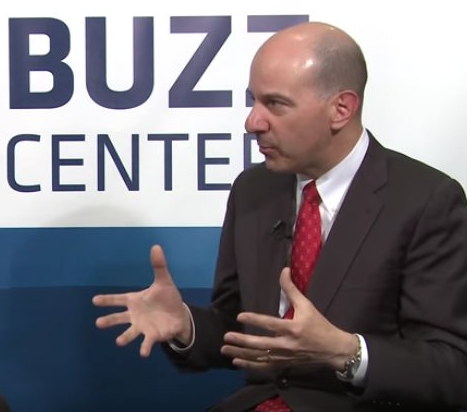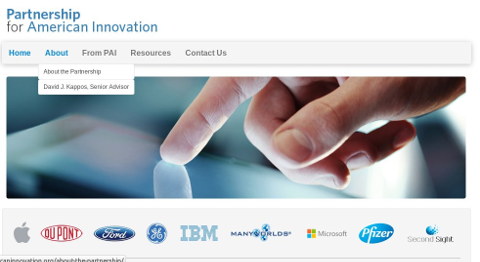
 Source: 2013 interview
Source: 2013 interview
Some public officials are acting like professionals (don't mind EPO leadership). Some academics act professionally too. Professor Dennis Crouch, for instance, now finds himself growingly interested in the Supreme Court's cases and he wrote about an upcoming event on Monday (Intellectual Property in the Supreme Court): "I’m looking forward to the Federalist Society teleforum this Friday, April 8, 2016 at 2:00 pm EST on the topic: Intellectual Property in the Supreme Court."
"Mr. Kappos is a patent lawyer, a patents maximalist and increasingly a lobbyist for the rich and powerful."With all its flaws notwithstanding, the Supreme Court of the US is reasonably important and quite highly regarded, especially or more so after Antonin Scalia died. Who would be silly enough to chastise the Supreme Court and even Congress? Apparently the former director of the USPTO. How tactless.
David Kappos complained about SCOTUS in New York a week ago. He doesn't seem to accept the fact that software patents are dying in the US, owing to the historic judgment of the highest judges. Kappos is no judge and not much of an accomplisher either; he just spent many years at IBM, which is a software patents aggressor, then leaped into the USPTO, whose biggest client was IBM. Now he's lobbying for software patents, profiting from software patents, and writing papers in favour of software patents. Here is his latest such move ("Law360 Opinion: Time For Congress To Leave The Patent System Alone, by David Kappos").
"Maybe Kappos simply found out that there's more money in fame and lobbying than there is in other jobs."To quote Kappos: "The U.S. patent system has undergone a number of dramatic changes in recent years, including passage and implementation of the 2011 America Invents Act, six U.S. Supreme Court cases impacting patent laws, new administrative rules by the U.S. Judicial Conference, and actions by the Federal Trade Commission and state attorneys general. Many of these changes were needed to address abuses in the system, where frivolous patent suits have been used by “bad actors” to essentially extort payments from businesses after unfairly accusing them of infringement. However, the powerful effects from these changes undertaken by multiple branches of government strongly suggest Congress can prudently step back from further reshaping the patent system. It is time to let the system embrace its major recent changes and work out implementation issues before further reform is seriously considered."
Mr. Kappos is a patent lawyer, a patents maximalist and increasingly a lobbyist for the rich and powerful. He even writes whitepapers in favour of software patents. When is this going to stop? It's inapproriate as it makes both IBM and the USPTO look as though they intervene with policy and interfere with judge's work, even Supreme Court Justices.
The other day patents maximalists (also huge proponents of software patents) noted that the "resignation of David Kappos [...] coincidentally happened shortly after he gave a strong pro-software patent speech."
"How much further can one allow these opportunists to go?"Maybe Kappos simply found out that there's more money in fame and lobbying than there is in other jobs. We truly hope he'll stop. This discredits the whole framework of patents in the US.
According to this new article about PTAB the USPTO folks are trying to "tilt the playing field just a little bit back in their favour." To quote the whole thing: "Since they came into force in September 2012 the post-issuance reviews introduced by the America Invents Act have helped make life far tougher for US patent owners. Last week, however, the USPTO announced some changes to the rules governing the process which just might tilt the playing field just a little bit back in their favour."
How much further can one allow these opportunists to go? No doubt a lot of patent lawyers are concerned because more patents just mean more business to them, in the same sense that more wars mean more profit to arms manufacturers. "Several heads of new firms told C&E they've pursued patent protection despite business method and software patents facing greater scrutiny from the U.S. Patent and Trademark Office," says this new article. It later blames Alice (at SCOTUS) by stating: "These moves fit a pattern, established by Audience Partners, of pursuing patents of processes that most people in the industry believe can’t be patented. Moreover, they’re coming in wake of Alice Corp. v. CLS Bank International, the June 2014 Supreme Court ruling that seemed to tighten eligibility while invalidating some software and business-method patents. In fact, the Software Freedom Law Center, which represents not-for-profit developers, said at the time that the decision was “one more step towards the abolition of patents on software inventions.” "
"As the world moves further away from software patents (the US included) Kappos is working to do the very opposite."Patent lawyers only pay attention to Alice when software patents withstand scrutiny, as another new article ("One-Court Alice Backlash: Delaware’s Judge Robinson, Critical of Recent Trends, Upholds Software Patents in Three Cases") serves to show. To quote: "The trend? In applying €§ 101 since Alice Corp. Pty. Ltd. v. CLS Bank Int’l., 134 S. Ct. 2347 (2014), courts have given software patents a rough go of it. District courts frequently cite Alice to strike down software patents. And as Judge Robinson notes, the Federal Circuit, for its part, has not upheld a computer-implemented patent under €§ 101 since DDR Holdings, LLC v. Hotels.com, L.P., 773 F.3d 1245 (Fed. Cir. 2014), the sole post-Alice victory for a software patent owner, issued a few months after Alice came down. See Improved Search at 8 & n. 4 (citing eight Fed. Cir. decisions striking down computer-implemented patents)."
To know that Mr. Kappos is some kind of anti-Alice (at SCOTUS) warrior these days helps us map him accordingly. As the world moves further away from software patents (the US included) Kappos is working to do the very opposite. ⬆
Update: It has just been pointed out to us [1, 2] that Kappos now works on a front group for several prominent proponents of software patents, including IBM (former employer), Apple, Microsoft, and HP. The following screenshot is self explanatory.
